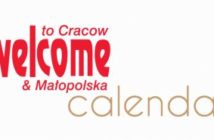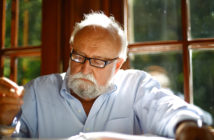![]()
• The International Cultural Centre, with you as its Director, coordinates in Poland the European educational programme of the European Year of Cultural Heritage. Why is the knowledge in this respect important and where is it lacking the most?
• The European Parliament and the Council of the European Union established 2018 as the European Year of Cultural Heritage (EYCH 2018). However, it was the year 2014 when the Council of the European Union pronounced heritage “the strategic resource of sustainable Europe”. This initiated a European campaign for the cooperation for the protection, preservation, re-use, as well as development and promotion of heritage. The goal is also to present cultural heritage in its diversity, both tangible and intangible. Why is heritage so important? It plays a major role in the construction of our identity, helping us better understand the places that we live in. The knowledge of European heritage builds, additionally, a sense of belonging to a larger European family. The Ministry of Culture and National Heritage appointed the International Cultural Centre to coordinate the activities of the EYCH in Poland. This is because the ICC has been working with broadly defined heritage since its early beginnings; now, with the EYCH, we are able to engage new tools and possibilities of its promotion. The role of the coordinator is to activate Polish organisations and institutions to become involved in seeing that the goals and objectives of the EYCH find their practical application.

Available research data (by Eurobarometr and the National Heritage Board of Poland) suggest that European citizens are proud of their heritage and that they appreciate it in other countries as well – a good example is that the presence of heritage sites determines the choice of holiday destination in 68% of cases (Eurobarometr “Europeans and cultural heritage”, 2017). However, according to Polish respondents, what prevents them from enjoying heritage is the lack of time and financial means, which should provide some food for thought for cultural institutions and the policy makers.
• What will be the role of Krakow and its history in your programme?
• EYCH 2018 is a campaign that promotes heritage from all regions of Poland and Europe, and Krakow is very much present on this map. One of the posters distributed in Polish cities as part of our information and promotion campaign contains the image of the Cloth Hall (Sukiennice) – Poland’s oldest shopping mall, whose first stalls were erected 761 years ago. Although our activities for this project are designed to reach across Poland and Europe, as a Krakow-based institution we make sure that our EYCH 2018 programme contains a local element. We have provided our official patronage to numerous Krakow events focused on heritage, from the Małopolska Days of Cultural Heritage, through the Rękawka Holiday, the Easter competition for the most beautiful Emaus tree, the Festival of Manuscripts at the Tyniec Abbey, or the Krakow Nativity Scene Competition.
The ICC conducts also its own projects, including the European Heritage Label conference, Heritage and its Potential for Development seminar, Architecture of Independence in Central Europe exhibition, publication of John Tunbridge’s The Changing of the Guard. Heritage at the Turn of the Century, and the series 12 Tours for 12 Months.
• Your programme is addressed primarily to young audience. What are the methods to reach them?
• Children and young adults represent an important target group for the EYCH 2018 campaign. In collaboration with Dwie Siostry publishing house we are preparing a children’s book titled The Polish Bestiary, which provides an attractive way to trace images of animals in culture and introduces young readers to various aspects of cultural heritage. We have planned a series of educational workshops across Poland to follow the book, and we have also developed a programme of heritage classes for primary and secondary schools. We also train teachers how to teach about heritage in an engaging and responsible way. The interest in these events is outstanding: Heritage with Class seminar, organised at the ICC in January, attracted crowds of attendees.
For primary and secondary school students we have developed heritage-related competitions and a series of promotional-educational gadgets (pencils, temporary tattoos, postcards).
![]()
Polska w europejskiej kampanii na rzecz dziedzictwa
• Kierowane przez Panią MCK koordynuje w Polsce ogólnoeuropejską akcję edukacyjną w ramach Europejskiego Roku Dziedzictwa Kulturowego. Jakie ta wiedza ma znaczenie i gdzie jej brakuje?
• Parlament i Rada Unii Europejskiej ustanowiły rok 2018 Europejskim Rokiem Dziedzictwa Kulturowego (ERDK 2018), ale już w 2014 Rada Europy uznała dziedzictwo za „strategiczny zasób zrównoważonej Europy”. Ruszyła więc europejska kampania, której celem jest współpraca na rzecz ochrony, zachowania, ponownego wykorzystania, a także rozwoju i promocji dziedzictwa. Chodzi również o pokazanie dziedzictwa kulturowego w całej jego różnorodności, materialnej i niematerialnej. Dlaczego dziedzictwo kulturowe jest tak ważne? Bo odgrywa ogromną rolę w budowaniu własnej tożsamości, pozwalając nam lepiej zrozumieć miejsca, w których żyjemy. Świadomość europejskiego dziedzictwa buduje z kolei poczucie przynależności do większej, europejskiej rodziny. Ministerstwo Kultury i Dziedzictwa Narodowego wyznaczyło Międzynarodowe Centrum Kultury do koordynowania ERDK w Polsce. Nie bez powodu, przecież MCK zajmuje się szeroko pojętym zagadnieniem dziedzictwa od początku swego istnienia. Teraz, razem z ustanowieniem ERDK, dostaliśmy nowe narzędzia i możliwości do promocji. Zadaniem koordynatora jest bowiem aktywizacja polskich organizacji i instytucji do realizacji działań wpisujących się w cele i założenia ERDK.
Przeprowadzone badania (Eurobarometr, badania NID-u) pokazują, że Europejczycy są dumni ze swojego dziedzictwa. Za przykład niech posłuży fakt, że obecność obiektów dziedzictwa kulturowego wpływa na wybór miejsca spędzania wakacji 68% z nich (Eurobarometr „Europejczycy i dziedzictwo kulturowe”, 2017). Przeszkodą w cieszeniu się dziedzictwem jest jednak, według polskich respondentów, brak czasu i środków, co powinno dać do myślenia instytucjom kultury i decydentom.
• Jaką rolę w państwa przekazie odegra Kraków i jego historia?
• ERDK 2018 jest kampanią promującą dziedzictwo z różnych stron Polski i Europy, Kraków jest w niej jak najbardziej obecny. Na jednym z plakatów, które widoczne są na ulicach polskich miast w ramach naszej akcji informacyjno-edukacyjnej, widnieją Sukiennice – najstarsza w Polsce galeria handlowa, w której pierwsze kramy stanęły już 761 lat temu. Choć przy okazji tego projektu działamy w skali ogólnopolskiej i europejskiej, jako instytucja związana z Krakowem staramy się, żeby w naszych działaniach w ramach ERDK 2018 był też obecny lokalny rys. Objęliśmy oficjalnym patronatem wiele krakowskich wydarzeń związanych z tematem dziedzictwa, począwszy od Małopolskich Dni Dziedzictwa, przez tradycyjne Święto Rękawki, Wielkanocny konkurs na najpiękniejsze drzewko emausowe, Rok Księgi w Opactwie Tynieckim czy Konkurs Szopek Krakowskich.
MCK realizuje też własne projekty, w tym m. in. konferencję Znak Dziedzictwa Europejskiego, seminaria Dziedzictwo i jego potencjał prorozwojowy, wystawę Architektura niepodległości w Europie Środkowej, publikację Johna Tunbridge Zmiana warty. Dziedzictwo na przełomie wieków czy cykl 12 spacerów na 12 miesięcy.
• Kierujecie swą akcję przede wszystkim do ludzi młodych. Jakich metod chcecie użyć by dotrzeć do ich świadomości?
• Dzieci i młodzież są jedną z ważnych grup docelowych kampanii ERDK 2018. We współpracy z Wydawnictwem Dwie Siostry przygotowujemy specjalnie dla najmłodszych książkę Bestiariusz polski, która w atrakcyjny sposób, poprzez tropienie wizerunków zwierząt w kulturze, zaznajomi młodych czytelników z różnymi aspektami dziedzictwa kulturowego. Zaplanowaliśmy cykl towarzyszących książce warsztatów edukacyjnych w całej Polsce, prowadzimy też program lekcji o dziedzictwie dla szkół podstawowych i średnich. Szkolimy również nauczycieli na temat tego, jak atrakcyjnie i mądrze uczyć o dziedzictwie. Zainteresowanie jest ogromne: seminarium Dziedzictwo z klasą, które odbyło się w MCK w styczniu, zgromadziło tłumy.
Dla uczniów szkół podstawowych i średnich przewidzieliśmy konkursy związane z tematem dziedzictwa i serię gadżetów promocyjno-edukacyjnych (ołówki, zmywalne tatuaże, pocztówki).









